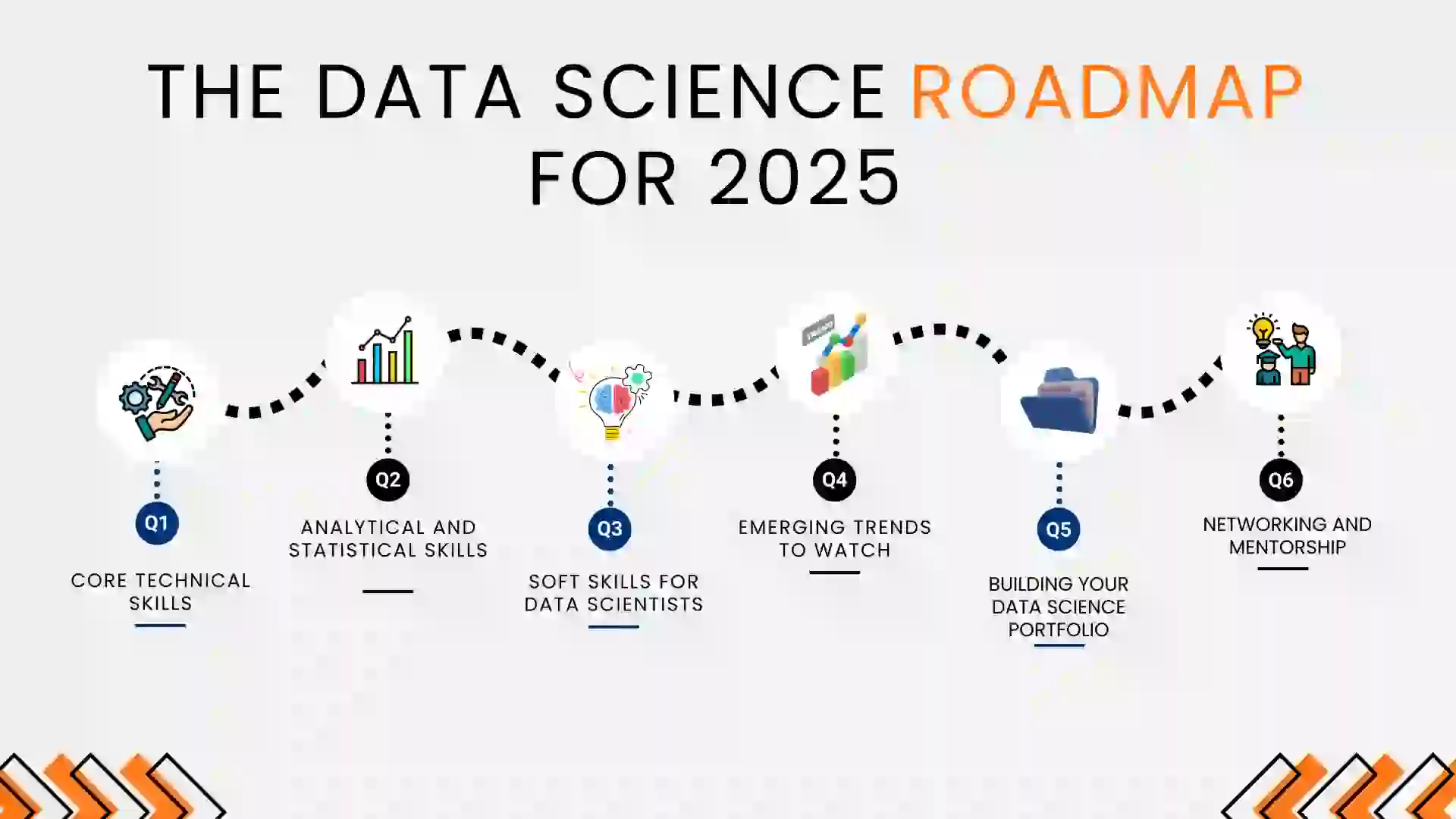Introduction
In the ever-evolving world of technology, data science has emerged as one of the most in-demand and lucrative career paths. By 2025, its role in industries like healthcare, finance, e-commerce, and technology is only set to grow. If you’re aspiring to become a data scientist or want to upgrade your skills, it’s essential to understand the roadmap to success in this field. This blog post will break down the critical skills, tools, and trends you need to master to thrive in data science by 2025.
Why Data Science?
The skill of drawing insightful conclusions from massive volumes of data is known as data science. Organizations rely on data scientists to make informed decisions, drive business growth, and create innovative solutions. With advancements in artificial intelligence (AI) and machine learning (ML), the demand for skilled professionals is skyrocketing.
Job Outlook:
- By 2031, data science employment is expected to expand by 36%, according to the Bureau of Labor Statistics.
- According to LinkedIn, data science has been among the top emerging jobs for the past five years.
Clearly, the time to dive into data science is now.
The Data Science Roadmap for 2025
To build a successful career in data science, you need to acquire a combination of technical skills, domain knowledge, and soft skills. Let’s break it down step by step.

1. Core Technical Skills
a) Programming Languages
Mastering programming is foundational for data science. The top languages to focus on are:
- Python: Known for its simplicity and versatility, Python remains the most popular language in data science.
- R: Ideal for statistical analysis and data visualization.
- SQL: Essential for database management and querying data.
b) Data Manipulation and Analysis
Learn how to work with large datasets using libraries like:
- Pandas and NumPy for data manipulation.
- Matplotlib and Seaborn for data visualization.
c) Machine Learning
Machine learning (ML) forms the backbone of advanced data science projects. By 2025, knowledge of these ML concepts will be crucial:
- Supervised and unsupervised learning.
- Deep learning and neural networks.
- Tools like TensorFlow, Keras, and PyTorch.
d) Big Data Technologies
With data growing at an unprecedented rate, familiarity with big data tools will be a must:
- Apache Hadoop
- Spark
- Cloud platforms like AWS, Azure, or Google Cloud for large-scale data processing.
2. Analytical and Statistical Skills
Data science isn’t just about tools; it’s about deriving insights. Strong analytical skills are vital.
- Understand statistics, probability, and hypothesis testing.
- Learn data modeling techniques.
- Grasp time series analysis for forecasting trends.
Proficiency in tools like Excel for basic analytics and Tableau or Power BI for business intelligence will enhance your capabilities.
3. Soft Skills for Data Scientists
While technical expertise is essential, soft skills often determine long-term success.
- Problem-solving: Frame real-world problems as data questions.
- Communication: Simplify complex findings for non-technical stakeholders.
- Collaboration: Work effectively in multidisciplinary teams.
4. Emerging Trends to Watch
Data science is an ever-evolving field. Staying ahead of the curve requires staying up to date with trends.
a) AI and Automation
AI-powered tools will streamline data analysis by 2025. Learning to integrate AI in workflows will set you apart.
b) Natural Language Processing (NLP)
As organizations process unstructured text data, NLP applications like sentiment analysis, chatbots, and language translation will gain prominence.
c) Ethics in Data Science
The focus on responsible AI and ethical data use is growing. Understanding data privacy regulations like GDPR and CCPA will be key.
d) No-Code and Low-Code Platforms
Tools like KNIME and RapidMiner allow non-programmers to perform data science tasks, democratizing access to the field.
5. Building Your Data Science Portfolio
A strong portfolio is your ticket to landing a dream job. Include projects that showcase:
- Real-world problem-solving using data.
- Diverse datasets from domains like healthcare, finance, or social media.
- Advanced skills like predictive modeling and deep learning.
Popular platforms like Kaggle, GitHub, and LinkedIn are excellent for displaying your work and connecting with professionals.
6. Networking and Mentorship
Engaging with the data science community is invaluable. Join forums, attend meetups, and participate in hackathons to expand your network. To learn more about the field, look for mentorship from seasoned experts.
Conclusion
By 2025, data science will continue to evolve, but its core principles will remain unchanged: mastering data, asking the right questions, and delivering actionable insights. Whether you’re starting your journey or looking to upskill, following this roadmap will set you on the path to success. The future of data science is bright. Embrace the challenge, and you’ll be well-prepared to thrive in this exciting field.




